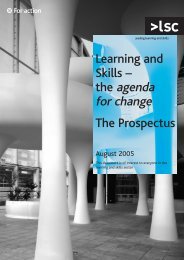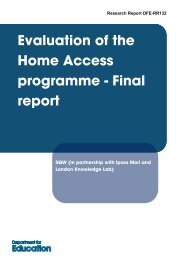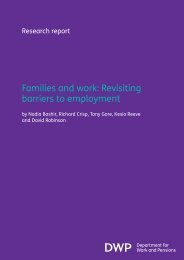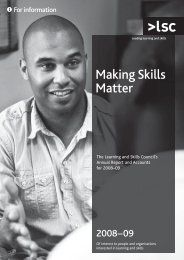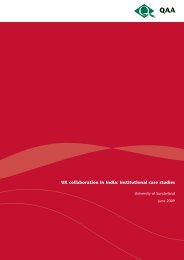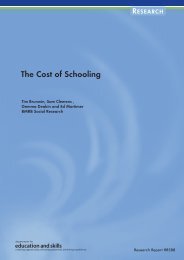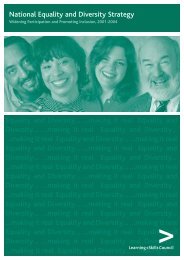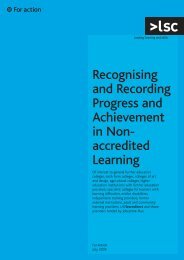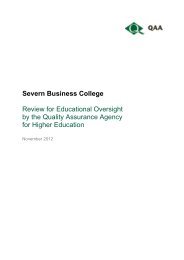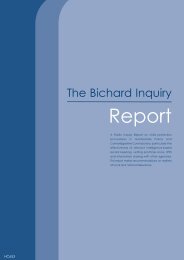The Learning and Skills Councils Annual Report and Accounts for ...
The Learning and Skills Councils Annual Report and Accounts for ...
The Learning and Skills Councils Annual Report and Accounts for ...
Create successful ePaper yourself
Turn your PDF publications into a flip-book with our unique Google optimized e-Paper software.
Our Working Practices<br />
Stakeholder<br />
communications<br />
<strong>The</strong> LSC has worked effectively with<br />
a large number of partners <strong>and</strong><br />
stakeholders, based on two-way<br />
communication <strong>and</strong> an open <strong>and</strong><br />
transparent approach.<br />
Colleges <strong>and</strong> training<br />
providers<br />
In the last year, we have worked<br />
alongside all LSC-funded providers to<br />
ensure that they are in<strong>for</strong>med about –<br />
<strong>and</strong> involved in – our programmes <strong>and</strong><br />
the policy decisions behind them.<br />
Through close working with the<br />
FE Reputation Group <strong>and</strong> the FE<br />
Communications Gateway Panel, we<br />
have ensured more effective provider<br />
communications to providers, provider<br />
groups <strong>and</strong> the FE sector as whole.<br />
We have enjoyed good working<br />
relationships <strong>and</strong> offered support <strong>and</strong><br />
guidance in joint activities to individual<br />
providers as well as to provider<br />
representative groups.<br />
Employers<br />
Our relationship with employers<br />
became increasingly important,<br />
reflected in the time <strong>and</strong> ef<strong>for</strong>t taken<br />
to develop effective channels <strong>and</strong><br />
communications <strong>and</strong> share ideas<br />
<strong>and</strong> approaches.<br />
Employer engagement continues<br />
through the dedicated National<br />
Employer Service, <strong>and</strong> with other<br />
employers through programmes such<br />
as the National Apprenticeship Service<br />
<strong>and</strong> Train to Gain.<br />
Our staff worked with employers at a<br />
national, regional <strong>and</strong> local level, <strong>and</strong><br />
maintained one-to-one relationships<br />
with key employers <strong>and</strong> organisations<br />
that represent them.<br />
We had regular meetings with groups<br />
such as the CBI, the Institute of<br />
Directors, the British Chambers of<br />
Commerce <strong>and</strong> the Federation of Small<br />
Businesses, <strong>and</strong> attended <strong>and</strong> spoke<br />
at relevant employer conferences <strong>and</strong><br />
seminars. We also regularly consulted<br />
with employers on key areas of<br />
learning <strong>and</strong> skills delivery.<br />
Third sector<br />
We worked closely with a range of<br />
third sector stakeholders, as providers<br />
<strong>and</strong> employers <strong>and</strong> as a source of<br />
expertise <strong>and</strong> valuable feedback<br />
on learning <strong>and</strong> skills delivery,<br />
particularly to underrepresented <strong>and</strong><br />
disadvantaged groups.<br />
Opinion <strong>for</strong>mers<br />
We have maintained regular contact<br />
with a small number of individuals<br />
who have been identified as being<br />
particularly interested in our work.<br />
Communication with business <strong>and</strong><br />
education leaders, politicians <strong>and</strong><br />
representative groups was through<br />
small discussion <strong>for</strong>ums <strong>and</strong> seminars,<br />
face-to-face meetings <strong>and</strong> specialist<br />
newsletters.<br />
Learners<br />
Learners played an integral role in<br />
how we shaped our work, our policies<br />
<strong>and</strong> our approach. Advice was sought<br />
through the National Learner Panel,<br />
which acted as the voice of the<br />
learner. <strong>The</strong> panel was made up of<br />
independent volunteers involved in all<br />
aspects of FE, giving learners a voice at<br />
national level.<br />
Other partners<br />
We worked with a range of delivery<br />
partners in different sectors.<br />
Equality <strong>and</strong><br />
diversity<br />
As a public sector organisation,<br />
promoting equal opportunities has<br />
been one of our core responsibilities –<br />
both in the way we treat our own staff<br />
<strong>and</strong> in the st<strong>and</strong>ards that we apply to<br />
<strong>and</strong> dem<strong>and</strong> of the learning <strong>and</strong> skills<br />
sector. We have had a statutory duty<br />
to report annually on our actions <strong>and</strong><br />
progress towards equality <strong>and</strong> diversity.<br />
Our Single Equality Scheme was<br />
published in 2007, placing the<br />
commitment to equality <strong>and</strong> diversity<br />
at the heart of everything we do.<br />
In 2008–09 we commissioned an<br />
external review of our progress. <strong>The</strong><br />
findings from the review indicated that<br />
the LSC has been at the <strong>for</strong>efront of<br />
addressing equality <strong>and</strong> diversity, has<br />
been perceived as a good role model in<br />
the learning <strong>and</strong> skills sector <strong>and</strong> has<br />
had significant impact <strong>and</strong> influence.<br />
Leadership <strong>and</strong> Governance<br />
LSC <strong>Annual</strong> <strong>Report</strong> <strong>and</strong> <strong>Accounts</strong> 2009–10 13



